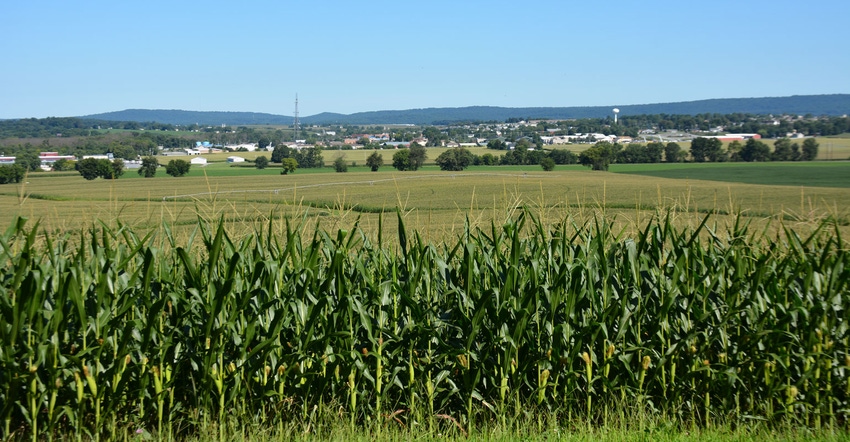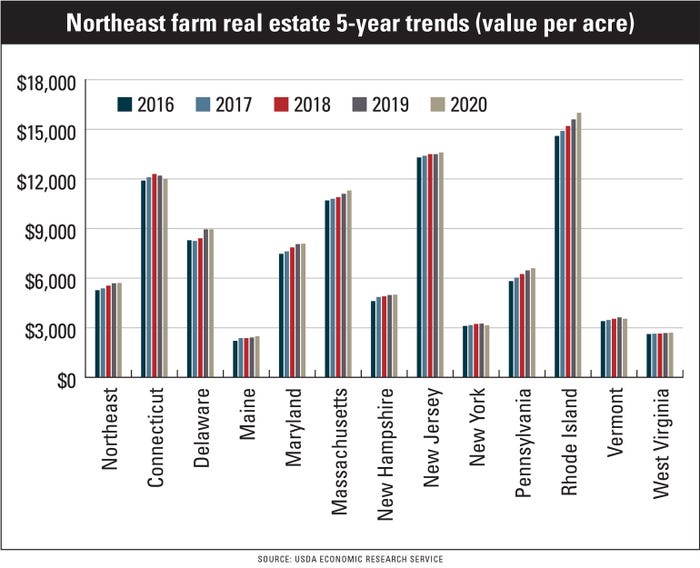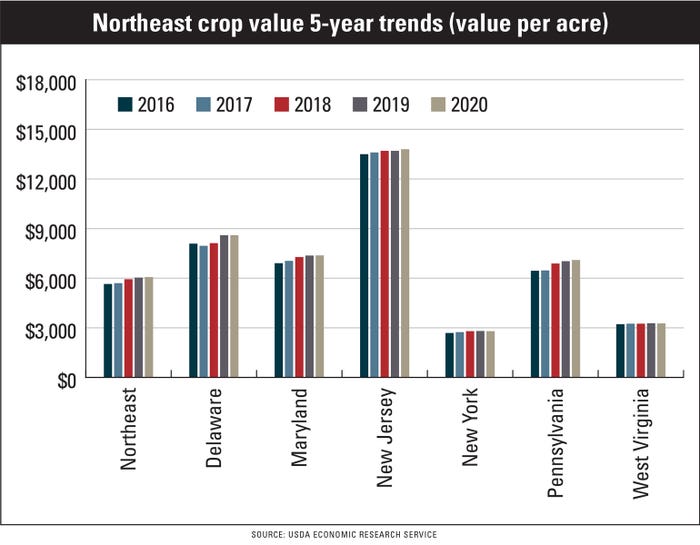
Farm real estate values in the Northeast are holding steady but declined in a handful of states, an indication that a depressed farm economy, particularly dairy, has taken its toll.
The average farm real estate value is $5,710 an acre in the Northeast, up 0.4% over 2019 and higher than the national average of $3,160 an acre. Farm real estate, as defined by USDA, is the value at which all land and buildings used for agricultural production, including dwellings, could be sold under current market conditions.
Cropland value is $6,070 an acre, an increase of 0.5% over last year but ahead of the national average of $4,100 an acre. Cropland value is the value of land used to grow field crops, vegetables or land harvested for hay.
Pasture value is $3,900 an acre in the Northeast, up 0.8% over last year but ahead of the national average of $1,400 an acre. As defined by USDA, this is the value of land that is normally grazed by livestock.
The numbers come from the USDA’s Agricultural Land Values Survey that was released earlier this month. The farmer survey was conducted in June and early July.
Jennifer Ifft, associate professor of ag economics at Kansas State University and formerly of Cornell University’s Charles H. Dyson School of Applied Economics and Management, says farmland values typically represent farm profits — though this lags, so a drop in farm profits doesn’t always show up right away in farmland values — and nonagricultural factors such as development pressure and recreational land use.
“The USDA estimates are a good, but inherently incomplete, barometer of the farm economy,” she says.
Rhode Island and New Jersey have the highest farmland values at $16,000 and $13,500 an acre, respectively, not surprising considering the intense development pressures in both states and the fact that Rhode Island, the smallest state by land mass in the country, doesn’t have much farmland to begin with.
The lowest farmland value is in Maine at $2,490 an acre, up 3.3% over 2019. Pennsylvania’s farmland value is $6,600 an acre, up 2% from last year.
Two states, New York and Vermont, saw farmland values drop. New York is $3,150 an acre, down 3.1% over last year, while Vermont, at $3,550, was down 2.2%. While acknowledging that she didn’t look completely at the data, Ifft says the declines are likely an indication of the struggling ag economies in both states, particularly dairy.
“Especially in dairy, it’s been tough the last few years,” she says. “Farmland values have been pretty steady in New York since 2014, so what I believe we see here is the long-term impact of low farm commodity prices exacerbated by the larger economy.”

Cropland values were highest in New Jersey at $13,800 an acre, 0.7% higher than last year. Ifft says this is likely because many specialty crops are grown in the Garden State along with development pressures in the country’s most densely populated state.
The lowest cropland values are in New York at $2,800 an acre, down 0.4% over last year. Pennsylvania’s cropland value is $7,100 an acre, up 1% over last year. Maryland’s cropland value is $7,380, up 0.1% over last year.

Pasture value is highest in New Jersey, $13,300 an acre, 0.7% higher over last year. The lowest pasture value is in New York, $1,540 an acre, up 0.7%. Pennsylvania’s pasture value is $3,370 an acre, 2.4% higher over last year.
About the Author(s)
You May Also Like






